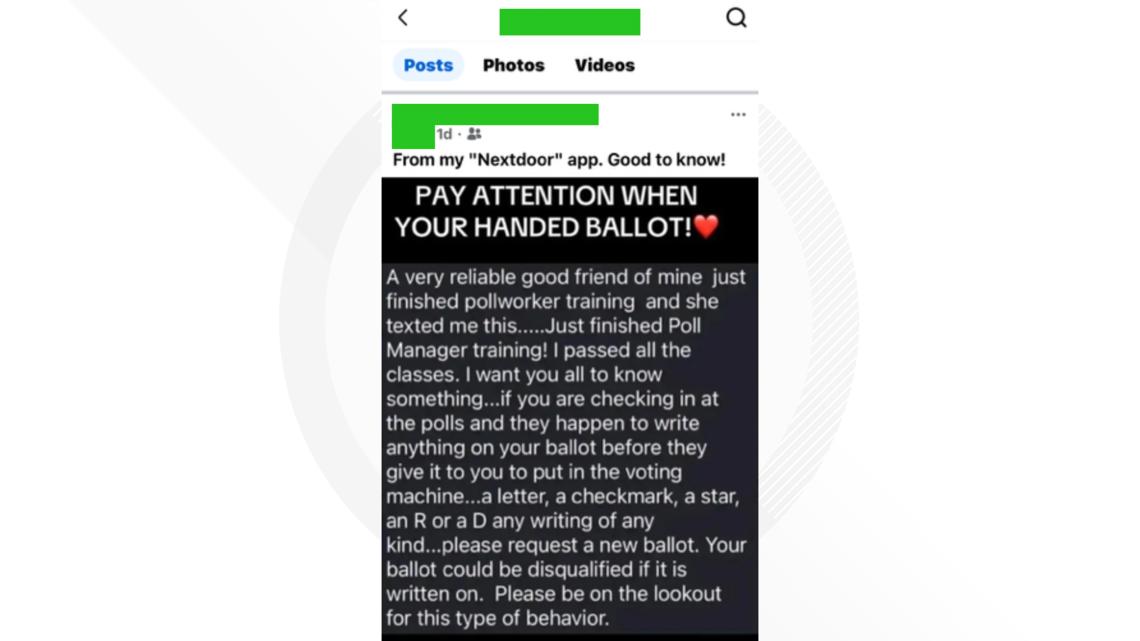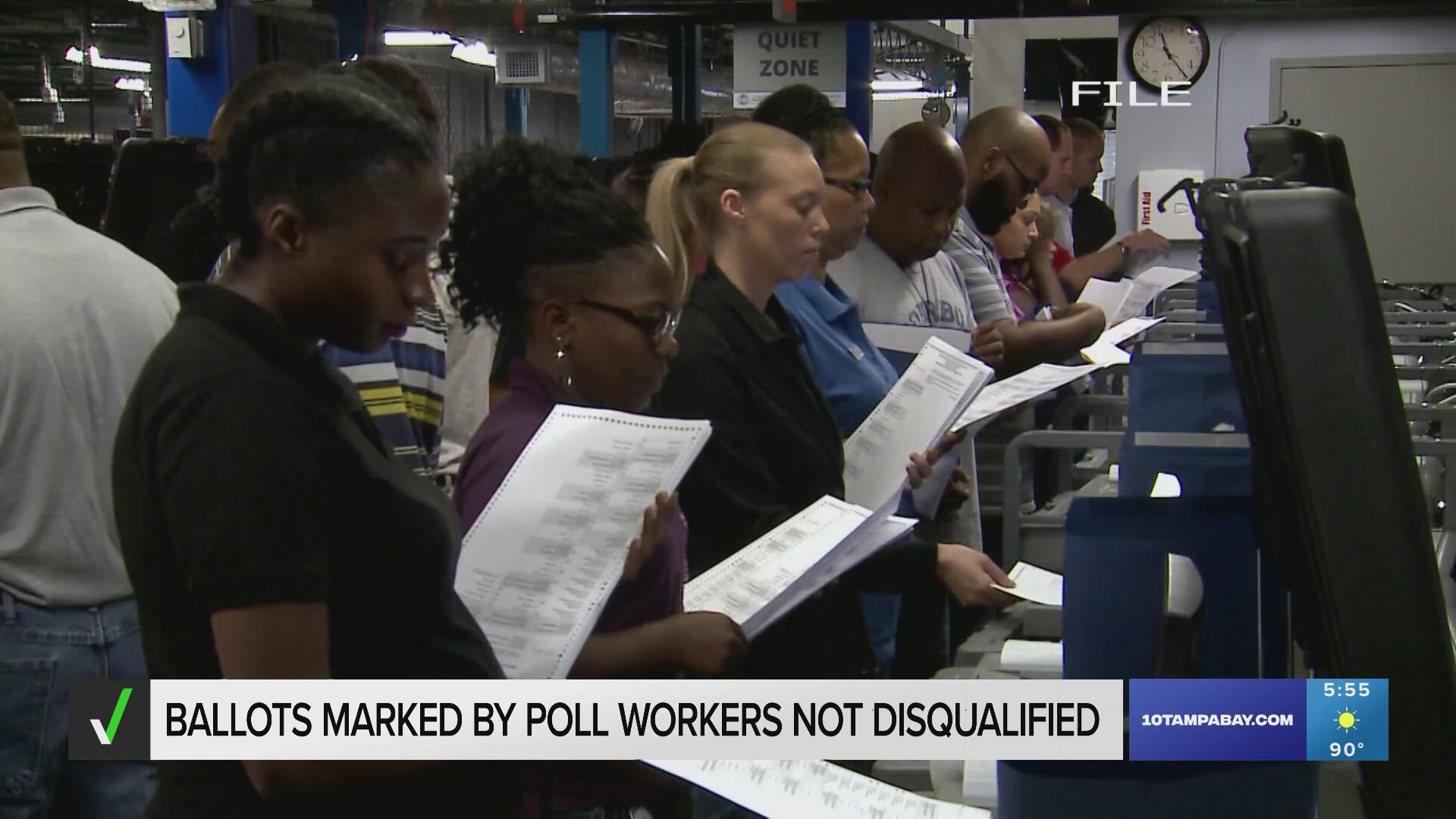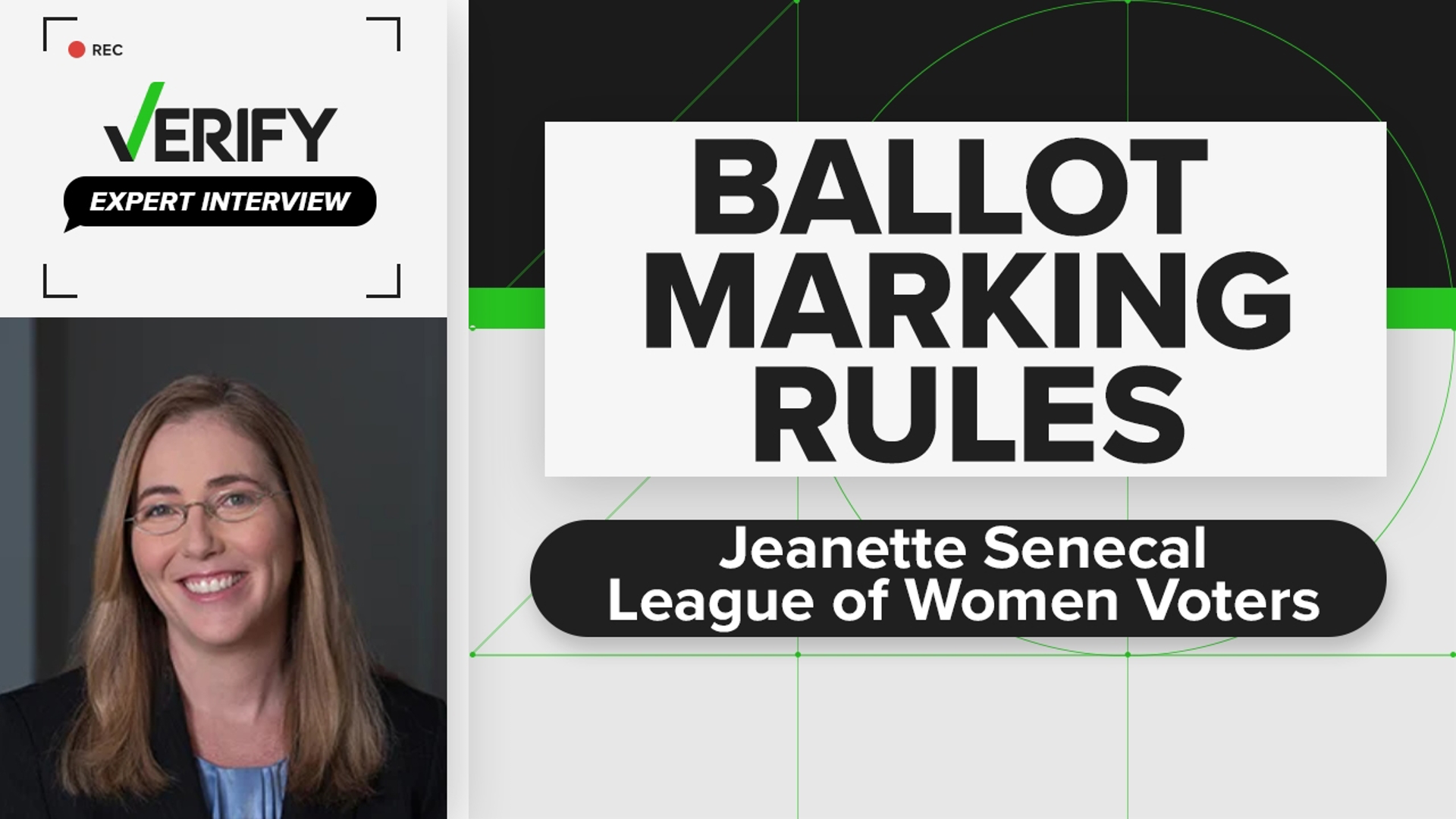ST. PETERSBURG, Fla. — As election season ramps up, so does misinformation spreading on social media.
Misinformation can range from entirely or partially false claims that may or may not intend to cause harm. Sometimes the information can be true in some situations but can become untrue when taken out of context or applied to a different situation.
One VERIFY viewer said that's why she had questions when she saw a Facebook post claiming to share advice from a poll worker.
The post claims to display a text message from someone who said they completed poll worker training. It reads as a warning to voters that poll workers might put a marking on their ballot that could cause it to be “disqualified.”


THE QUESTION
Can poll workers "disqualify" your ballot by writing on it?
OUR SOURCES
THE ANSWER
No, poll workers cannot "disqualify" your ballot by writing on it.
In Florida, they are trained not to make any markings on a ballot, and state law outlines how to resolve a ballot that has extraneous markings on it.
WHAT WE FOUND
While it's unclear where the claim originated, it has appeared on social media across several platforms, including this TikTok video, since at least 2020.
Poll workers are specifically trained not to write on ballots once given to voters, according to Sarasota County Supervisor of Elections and past president of the Florida Supervisors of Elections statewide association Ron Turner.
“We don’t touch ballots, put marks on them at all,” he said. “When we issue a ballot in person, whether that’s early voting or election day, the poll worker no longer touches that ballot... and so there’s no opportunity to make any marks or anything on that.”
If there were extraneous markings on a ballot, whether by a poll worker or a voter, state law outlines a process to resolve the issue.
Turner said a stray mark on a ballot could impact the tabulator's ability to read it properly.
In those cases where the voter went to a polling place, they would be given a new ballot to cast properly.
If a vote-by-mail ballot was improperly written on and unreadable for the tabulator, Florida law provides instructions to ensure every legal vote is counted.
Ballots that aren't able to be read by a tabulator are put before a canvassing board, as outlined by Florida statute. The canvassing board is specific to each county and is made up of its supervisor of elections, a county court judge and the chair of the board of county commissioners.
The board examines each ballot to determine "voter intent," which essentially means how someone voted.
“We sit and go through those [ballots], you know, hundreds of them, to make sure that we are honoring whatever that voter’s voice was – the intent of their ballot,” Turner said. “So there’s a lot of processes in place that would keep this from occurring, what’s being said on this post.”
To ensure election workers don't improperly mark a ballot on accident, Turner said they are not allowed to have blue or black pens or pencils on the table where vote-by-mail ballots are opened. Any notes or logs taken are done in red or green ink, he said.
Jeanette Senecal, Senior Director of Mission Impact at the League of Women Voters, said that if a vote-by-mail ballot arrives at the voter's home with a mark or damage already on it, they can contact their supervisor of elections to request a new, clean ballot.
"It's called a spoiled ballot," she said. "You would have to turn in the unvoted [or spoiled] ballot so that there's not multiple ballots in play. But you can get a new ballot."
Laws in other states
In some states, election laws require poll workers to mark ballots in certain situations.
The North Carolina State Board of Elections responded to these claims by explaining that poll workers in the state often write on certain ballots for organizational purposes. For example, "election workers write an identifying number on the ballots of voters who vote by mail or during the in-person early voting period," according to the agency.
This is done in case ballots need to be re-counted, or if an issue arises with the voter, like if the voter sends in a vote-by-mail ballot then dies before Election Day or votes more than once. Election officials there said these markings protect and secure North Carolina's voting system, and do not "disqualify" a ballot.
"If that is happening, that should only be at the top of your ballot or in the indicated space," Senecal said. "But it would not be anywhere in the field where the offices and the candidates are marked. If there is any kind of stray marking where the offices and candidates are listed, you would definitely want to ask for a new ballot."
Misinformation during elections
Researchers from the Massachusetts Institute of Technology (MIT) have found that from 2006 to 2017, “false news peaked on Twitter during the 2012 and 2016 presidential elections.”
Another group of researchers analyzed misinformation seen during election cycles and determined that much of it includes claims about the U.S. election system and how polls are managed.
When looking at how that messaging impacts public opinion, researchers said “it seems easier to damage [voters’] confidence than to strengthen it.”
As tools like artificial intelligence advance, media consumers face more content that takes even more brainpower to confirm as fact.
Supervisor Turner said he encourages voters to reach out to their local Supervisor of Elections Office if they have any questions.
For more resources on what to know ahead of the election, you can find information on everything from voting for overseas military personnel to getting help with translating at the polls on the Florida Department of State’s Division of Elections website.


